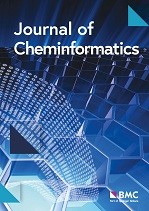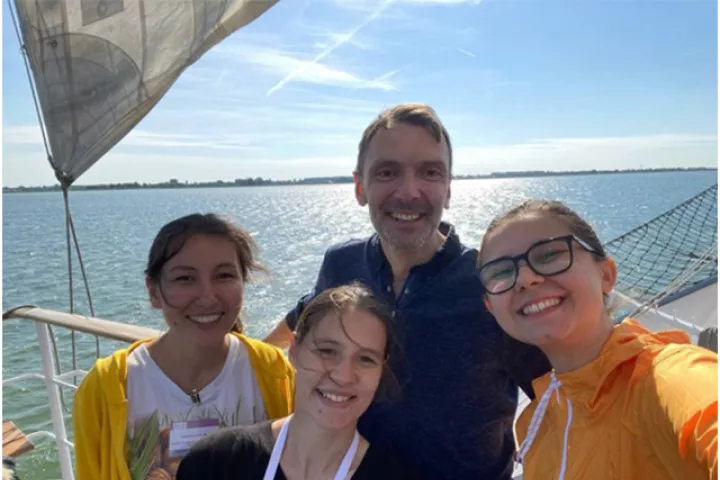
Chemoinformatics and drug design
The primary aim of the group is development of new chemoinformatic approaches, implementation of computational pipelines and their application to drug design. The group has expertise in molecular docking and molecular dynamics, pharmacophore modelling, machine learning and artificial intelligence. We develop approaches and software for de novo structure generation, hit/lead optimization and virtual screening and apply them and state-of-the-art tools to discover new hits and optimize compound properties. The group is partially involved in support of internal institutional databases of chemical compounds.
Development of chemoinformatic approaches, their software implementation and application of the developed and state-of-the-art tools to solve practical tasks related to drug design. In particular, we are focused on approaches to de novo design and structure optimization, machine learning and artificial intelligence.
De novo design of synthetically feasible compounds
Within this project we develop the framework of chemically reasonable mutations (CReM) for fragment-based structure generation which have a unique feature to generate synthetically accessible compounds. On top of CReM we develop multiple tools to address different practical tasks related to chemical space exploration: de novo hit generation, multi-objective hit/lead optimization, scaffold decoration and analogues enumeration. These tools use molecular docking, 3D pharmacophores and machine learning models to guide the search.
https://github.com/DrrDom/crem
https://crem.imtm.cz
3D pharmacophore modelling
We develop a framework of representation of 3D pharmacophores, which provides fast identification of identical or similar pharmacophores and calculation of 3D pharmacophore hashes, descriptors and fingerprints. These abilities are used in development of ligand-based pharmacophore models, retrieve pharmacophores from molecular dynamic simulations of protein-ligand complexes, virtual screening using pharmacophores and development of machine learning models to search for new promising hits.
https://github.com/DrrDom/pmapper
Interpretation of machine learning and AI models
We are working on development of approaches to interpret and retrieve knowledge from machine learning and AI models, study applicability of different interpretation approaches and benchmark them. The major goal is to shed light on AI models, which are usually considered “black boxes”, and better understand their decisions. This should raise the trust to these models from medicinal chemists and the retrieved structure-property relationships can be used to guide optimization of compound properties.
https://github.com/DrrDom/spci
https://github.com/ci-lab-cz/ibenchmark
Multiple-instance learning
We develop a framework and implement algorithms of multiple instance learning which allows to represent a single compound by multiple instances (e.g. conformers, tautomers, protomers, etc) that greatly improves predictive performance of models. Using the novel neural network models we are able not only to predict a target property value but also to retrieve key instances, for example bioactive conformers, that helps better understanding of the modelling property and allow rational optimization of compound properties. This is a collaborative project with Strasbourg University and Kazan Federal University.
https://github.com/cimm-kzn/3D-MIL-QSAR
Drug design
We support and participate in various drug design projects, in particular, currently we work on: i) lead optimization of tubulin inhibitors as anticancer agents, ii) de novo design of anti-tuberculosis compounds, iii) scaffold hopping and searching for new MARK4 inhibitors as potential anti-Alzheimer agents. Within these projects we collaborate with internal and external groups of researchers.
| Project: | Postdoctoral fellow/Researcher |
|---|---|
| Supervisors: | Polishchuk Pavlo Ph.D., M.Sc. |
| Available: | 1 |
| Intended for: | Postdoctoral training |
| Summary: |
The group of chemoinformatics and drug design at the Institute of Molecular and Translational Medicine, Faculty of Medicine and Dentistry, Palacky University in Olomouc, Czech Republic (https://imtm.cz/laboratories/chemoinformatics-and-drug-design) seeks for a postdoctoral fellow with experience in chemoinformatics and programming. The primary objective of the group is development of new computational approaches and software tools in drug design and their application in medicinal chemistry projects on hit/lead identification/optimization and target identification. The successful candidate will be mainly involved into the project on de novo fragment-based drug design and optimization. He/she will implement new and improve existing tools and approaches, validate them retrospectively and apply those tools in ongoing medicinal chemistry projects conducting at our institution in close collaboration with medicinal chemists and biologists. The candidate can be involved in other research projects depending on his/her experience and skills. The formal requirements: PhD in chemistry, chemoinformatics, computer science or related fields or 3 years of experience in relevant fields experience with molecular docking/pharmacophore modeling/machine learning knowledge of RDKit good Python programming skills and experience in software development data analysis skills basic medicinal chemistry knowledge is a plus good publication record excellent writing and spoken English The position will be opened for 2-3 years with a possibility of extension. Informal inquiries as well as applications, including curriculum vitae and bibliography, cover letter describing candidate research interests and past accomplishments should be sent via email to pavlo.polishchuk@upol.cz. |
| Project: | Applicability domains in machine learning modeling |
|---|---|
| Supervisors: | Polishchuk Pavlo Ph.D., M.Sc. |
| Available: | 1 |
| Intended for: | Master training |
| Project: | Computationally guided optimization of compound properties |
|---|---|
| Supervisors: | Polishchuk Pavlo Ph.D., M.Sc. |
| Available: | 1 |
| Intended for: | Master training |
| Project: | Computationally guided optimization of compound properties |
|---|---|
| Supervisors: | Polishchuk Pavlo Ph.D., M.Sc. |
| Available: | 1 |
| Intended for: | Master training |
| Project: | Novel 3D pharmacophore representation for machine learning |
|---|---|
| Supervisors: | Polishchuk Pavlo Ph.D., M.Sc. |
| Available: | 1 |
| Intended for: | Master training |
| Project: | Fragment-based de novo design using pharmacophore models |
|---|---|
| Supervisors: | Polishchuk Pavlo Ph.D., M.Sc. |
| Available: | 1 |
| Intended for: | Master training |
| Project: | Fragment-based de novo design using pharmacophore models |
|---|---|
| Supervisors: | Polishchuk Pavlo Ph.D., M.Sc. |
| Available: | 1 |
| Intended for: | Master training |



